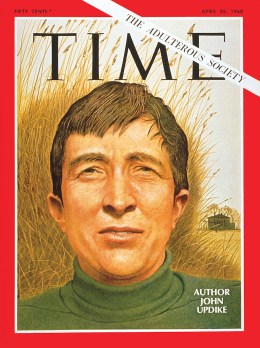
ISSUE DATE: Apr. 26, 1968
ALSO APPEARED: Oct. 18, 1982
THE BUZZ:
Despite the heavy breathing on all sides, Updike in Couples is really only reworking the territory that he has claimed for his own since he made his first appearance as a New Yorker short-story writer 15 years ago. In his own words, he is “kind of elegiacally concerned with the Protestant middle class.” Among modern American writers, only John Cheever shares Updike’s sense of accumulated loss, his feeling that the national past contained a wholeness and an essential goodness that have now evaporated. Even John O’Hara, an acknowledged social historian, makes no plea for the special virtues of the past. For other novelists, the present may be a disaster, but there is no indication that things ever were any better. When they do turn to the antecedents—John Barth in The Sot-Weed Factor or William Styron in The Confessions of Nat Turner—it is only to show that America has been headed for catastrophe right from the start.
Updike sees not catastrophe but an approach to fulfillment in past American experience, and his earlier work was a fond evocation of its elemental struggles, its integral faith and its microcosmic triumphs. In Couples, this elegy is modulated into a lament for the pampered, wayward millions of today.
Read the full story here
